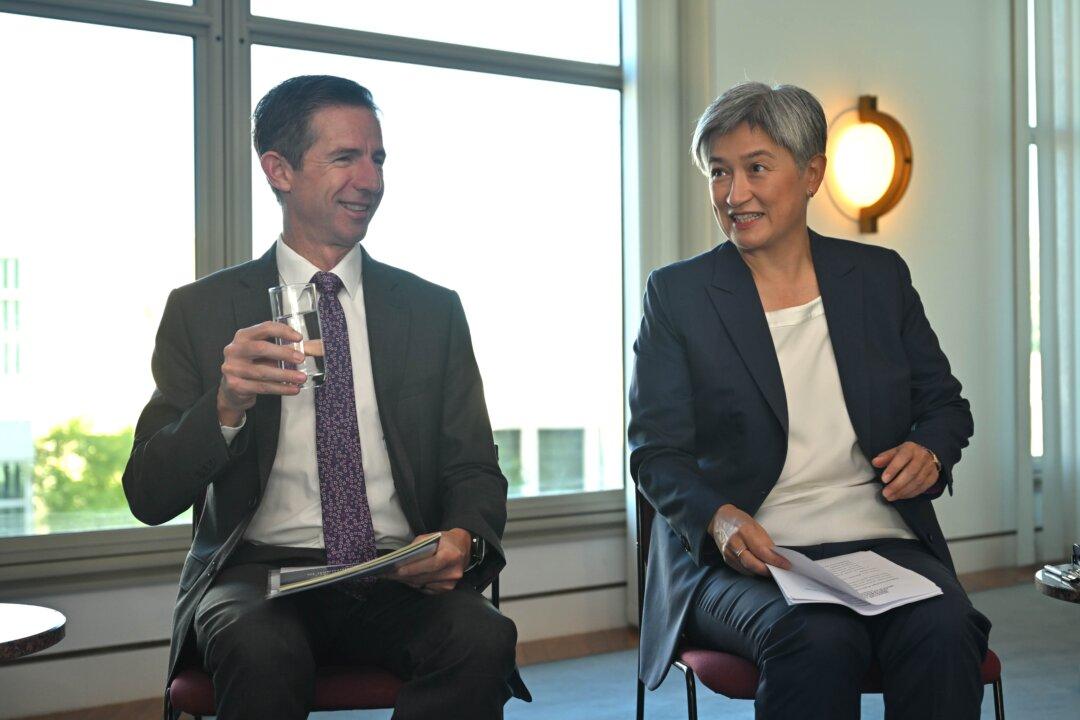Concerns over Chinese influence in the Pacific have led the Australian foreign minister and her opposition counterpart to make the trip to Tuvalu for security talks, coupled with a discussion on the island’s severe vulnerability to the ongoing effects of climate change.
Ahead of the delegation arriving today, Foreign Minister Penny Wong said via a statement that Australia’s partnerships with Pacific neighbours are critical to “the security, safety, and prosperity” of Australia and the region as a whole.
Tuvalu, a Pacific Islands nation of about 11,200 people, has received financial aid for infrastructure projects from Beijing since 1979, including the construction of government buildings, roads, and sports facilities. Chinese companies have also invested in Tuvalu’s fishing industry, which provides much-needed revenue for the country.
Despite these economic ties, Tuvalu has maintained a delicate balancing act in its relations with China. It is wary of Beijing courting favour with nations in the region by providing financial assistance in return for allowances for its strategic military presence.
In January, fellow Pacific nation Nauru effectively severed ties with Taipei when its President David Adeang said Nauru would no longer recognise Taiwan as a country separate from China.
After Tuvalu’s General Election in February, Feleti Teo became prime minister, which raised concerns with Pacific allies that he would revoke the nation’s long-held recognition of Taiwan on the back of Chinese pressure.
Falepili Union
The visit by Senator Wong and Liberal Opposition Senate Leader Simon Birmingham to the nation’s capital Funafuti, is aimed at reaffirming the Falepili Union, a partnership that focuses on human mobility and climate cooperation.The Union, signed in 2023 was established based on the values of care and mutual respect and elevates the parties’ relationship to one which is “advanced, integrated, and comprehensive.”
However, the wording of the agreement has proved somewhat controversial.
Of particular contention is a clause that reads: “Tuvalu shall mutually agree with Australia any partnership, arrangement or engagement with any other State or entity on security and defence-related matters. Such matters include but are not limited to defence, policing, border protection, cyber security and critical infrastructure, including ports, telecommunications and energy infrastructure.”
Debate was sparked among policy analysts and academics who say the agreement is an overreach by Australia on Tuvalu’s sovereignty, fueled by its intentions to align Pacific nations under a policy aimed towards shoring up territories against further Chinese military intrusion.
They were also critical of a perceived lack of clarity and the fact it was signed without consultation with the island’s people.

Climate Migration
Tuvalu’s concerns about climate change have also shaped its relationship with Beijing.Rising sea levels threaten to inundate the low-lying island nation, making it a vocal advocate for action on climate change.
China, as the world’s largest emitter of greenhouse gases, has faced criticism from Tuvalu and other Pacific nations for its perceived lack of action on cause mitigation.
Changes in weather patterns affecting traditional fishing and agriculture practices, sea-level rises, coastal erosion, saltwater intrusion, and extreme weather events have left the island at the mercy of the ocean.
It could be completely submerged if scientists’ predictions of a sea-level rise of 20-40 centimetres over the next 50-100 years materialise.
To address these concerns, Australia will provide adversely affected permanent residency under the Falepili Union.
Signed in late 2023, during the term of former Prime Minister Kausea Natano, the agreement grants migrants access to Australian education, health, and key income and family support on arrival.
Offering relocation visas for a nation’s people due to the catastrophic implications of climate change is a world first.
The agreement also commits Australia to “work together to help the citizens of Tuvalu to stay in their homes with safety and dignity, including by promoting Tuvalu’s adaptation interests to other countries, including through regional and international forums.”
Prime Minister Anthony Albanese said last year that developed nations have a responsibility to provide assistance to countries like Tuvalu that are vulnerable to climate change.
“There will be a special visa category of up to 280 [Tuvalu] citizens each year and they will have special rights to work, to study, to participate in Australian society,” Mr. Albanese said.
Senator Wong said presenting a united front across the political divide outlined Australia’s commitment to Tuvalu.
“The government and opposition visiting together is a clear statement to the region, that Australia is a steadfast partner in ensuring a region that is peaceful, stable and prosperous,” she said.
Senator Birmingham concurred, saying “Australia is stronger when we speak with one voice, which we emphatically do through these displays of bipartisan commitment to our Pacific Island neighbours.”







